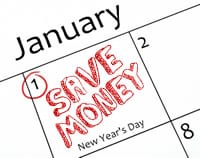| …. |  |
You know how to spend less on your purchases – shop sales, use coupons, buy used, or trade with a friend. But you don’t want to, because you’ve found that it takes a lot of work and your time is valuable. I complete agree – that’s why I keep it simple.
I am not someone who buys things just because the price has been reduced. I don’t spend hours cutting coupons or scouring sales fliers. I only buy what I need, and I only check for sales and coupons in the Sunday paper.
But, I have found that simple habits have made a big difference in our expenses.
My toothpaste habit: When we need to buy toothpaste, we always look for a sale at the local grocery or drug store. Typically, we can find a standard size tube of brand name toothpaste for 99 cents on sale. Then I check the Sunday coupons and usually find a 35¢ off coupon that the store will double (if it’s the grocery store). When I’m lucky, I only pay 29¢ for toothpaste – compare that to the normal $3-4 dollar price! It’s so easy. I know what I’m looking for, where to find it and it’s there when I need it.
My hairstyling habit: I used to get my hair cut locally, but my friend was shocked at the price I was paying. She suggested I go out of town to a less expensive area to get my hair done. That alone saved me 50% of the cost. But I didn’t let it stop there. I stopped getting my hair colored at the salon, (more money saved) and then I did some research and looked at beauty schools. I can get my hair cut at a school for about $25 including tip. Yes, they’re students, but I trust them because they’re working under the eyes of a professional. In addition, I try started waiting longer between appointments. I now try for quarterly instead of every 8 weeks (4x per year instead of 6). I went from spending $1,400 a year on my hair to $100 – not bad! And I love the way my hair looks.
My library habit: I love my library! Libraries aren’t just for books. You can borrow the whole season of a popular TV show on DVDs, borrow a music CD, audio books (DVD or mp3) and books (paper or for your device). All free. We log onto the library website to research what they have and place holds (saves us time and gas). Our library has free classes, speaking events, and now it offers free passes to local tourist spots. You can borrow a pass to go to the museum for free (or discounted). I can’t say enough good things about libraries. They’re the cornerstone for reducing entertainment expenses.
My friend habit: Our friends traveled to same vacation spot that we’re visiting this summer. They were nice enough to loan us their travel books and brochures so we can benefit from their experience. Then, a friend introduced me to someone who is actually from one of the countries we are going to. She shared her “must see and do” list with us and loaned us a DVD to watch. These are perfect examples of borrowing from friends.
I wasn’t always like this. I used to overspend. I’m good with my money, but I didn’t wake up one morning as a savings convert, going full throttle after deals like a fiscal zealot. It’s all the little steps that add up to big savings. And, I add new steps when I find that they’re convenient and fit into my routine.
If this is something that interests you, you’ll need to think outside the box. Find the little savings habits that are right for you. If you can’t think of anything new to reduce, recycle or reuse to lower your expenses (and reduce your clutter), then do a little internet research or try one of one of my favorite frugality books: Amy Dacyczan’s The Complete Tightwad Gazette or Judith Levine’s Not Buying It: My Year Without Shopping. If you haven’t read Amy’s book, it’s a quick read with tons of tips Judith’s is more of a journal of her year, chronicling what she did and didn’t do.
These are just a few examples of how little habits can make a big difference. I could go on and on.
And if that isn’t enough, in the next newsletter I will discuss increasing your income.



 Question: Which of the following is worth more?
Question: Which of the following is worth more?
